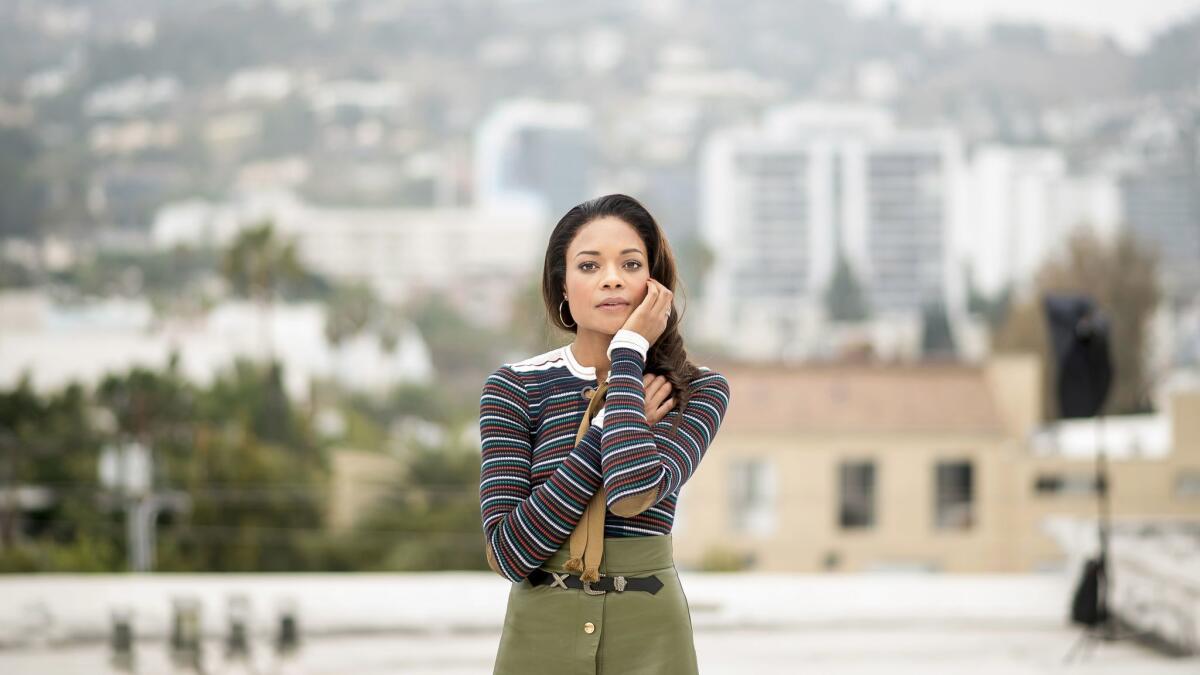Naomie Harris bypasses the stereotype and makes the crack addict real in ‘Moonlight’

- Share via
A professional actor since age 9, London-born Naomie Harris has played a post-apocalyptic survivor (“28 Days Later”), an updated Moneypenny (“Skyfall,” “Spectre”) and a voodoo witch for the “Pirates of the Caribbean” franchise. Then came her career-changing performance as Paula, a young boy’s drug-addicted single mother in Barry Jenkins’ Miami-set coming-of-age film “Moonlight.” “Magnificent” is how one critic characterized Harris’ raw, commanding portrayal, one which has put her name on every supporting actress nomination list, including the recent Golden Globes and Screen Actors Guild Award announcements.
Recently, Harris, 40, sat down at West Hollywood’s Le Parc Suite hotel to talk about “Moonlight,” her immersive monthlong role preparation and the unparalleled freedom that director Jenkins afforded her — including a searing, improvised moment where she digs into her teenage son’s front pocket in search of money for drugs. “I felt that it was important to incorporate the fact that when you have an addiction it can be an emotional roller coaster,” says Harris. “Paula can be sweetness and nice then [suddenly] become enraged and flip a table over.”
You have a rule about not accepting parts that typecast black women. How did Barry Jenkins change your mind?
He said, “I don’t want to ask you to play a stereotype. But I want to tell my story and the fact is that my mother was a crack addict, so what do I do?” I thought for the first time someone was saying to me, “I want to tell a certain story properly and with the full emotional investment of the character.” So I said, “Yes.”

Naomie Harris describes the last-minute introduction that ensured spontaneity in a key scene in “Moonlight.”
Part of the “Moonlight” backstory now is that, because of visa issues, you filmed your entire role in three days. What happened on Day 1?
I’ve no real awareness of addiction. I’ve never been addicted to anything. No one in my family is an addict. So my first scene was one in the middle section where she’s deep into her crack addiction. I’d done my research, but I [worried] that Barry might say, “That’s not how addicts act.” It was terrifying.
Not only that, you had to work with three different actors playing your son at different ages.
When you’re working with kids, you usually spend time with them beforehand building up rapport. But I didn’t have that time. Alex Hibbert is 11 and had never acted before. I was lucky because he’d worked already with [co-star] Mahershala Ali, who’d already warmed him up. By the time I got to set, Alex was phenomenal, a pro.
What’s the trick to nailing a Liberty City accent?
When I’m learning an accent, I’ll stay in the accent for about a week. I’ll go shopping in London in the accent, I’ll do everything in the accent. But [while filming] I don’t like to stay in accent. It was particularly important not to stay in accent on this set. Not just Barry but also some of [the actors playing] my son had experiences of addiction in their own families and were reliving a lot of stuff. They needed to know [the difference between] Naomie the actress and Paula the character.
What’s Barry Jenkins like as a director?
He can be very experimental. Sometimes he would get the actors to surprise me. In my final scene, he told Trevante [Rhodes] to light my cigarette and to touch me. That set me off really. You know the apology [that Paula gives] at the end? That wasn’t in the script. That moment, it just released something in me.

The trailer for “Moonlight.”
The most helpful thing for me was a wardrobe assistant who’d lost a child and was kind enough to share her journey with me.”
— Naomie Harris
In “Collateral Beauty” you play a grief counselor opposite Will Smith’s mourning parent. What sort of prep did that require?
The most helpful thing for me was a wardrobe assistant who’d lost a child and was kind enough to share her journey with me. Before each scene, she’d bring me a poem or a piece of writing from a grief forum, then she’d talk me through it, as in “This is the stage I’d be at,” or “This is how I’d feel at this moment.”
Recently, at a SAG-sponsored panel for “Collateral Beauty,” you talked of the experience of not realizing you’d been replaced in your first movie until you were at the premiere. Was that a surefire sympathy-getter?
Everyone went “Awwww.” Then Will interrupted and said, “And she told me that story and I thought it was the funniest thing I’d ever heard.” [laughs]
See the most read stories this hour »
More to Read
From the Oscars to the Emmys.
Get the Envelope newsletter for exclusive awards season coverage, behind-the-scenes stories from the Envelope podcast and columnist Glenn Whipp’s must-read analysis.
You may occasionally receive promotional content from the Los Angeles Times.










